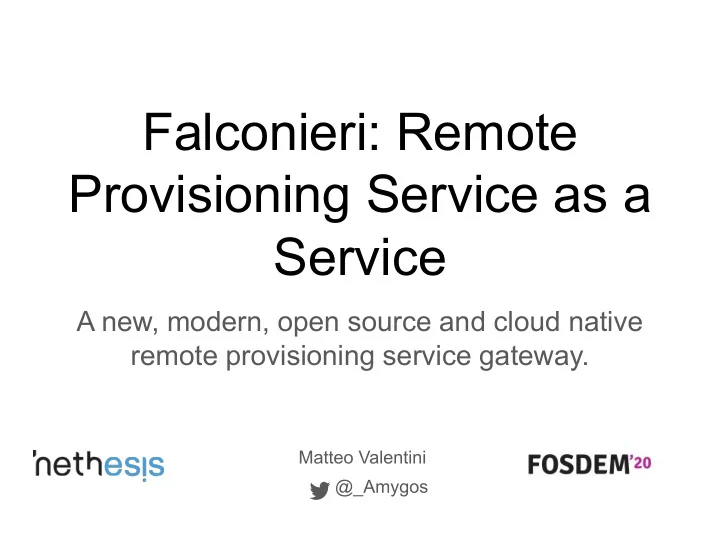

Falconieri: Remote Provisioning Service as a Service A new, modern, open source and cloud native remote provisioning service gateway. Matteo Valentini @_Amygos
Intro: Remote Provisioning Service Theory
Intro: What is it a Remote Provisioning Service? The scope of Remote Provisioning Service is to solve the problem of the first time phone configuration. Without a RPS the phone must rely on local mechanism for initial provisioning, like: ● DHCP Option 66 ● UPnP _Amygos
Intro: What is it a Remote Provisioning Service? _Amygos
Intro: What can do a Remote Provisioning Service? ● Assign a configuration to a device even before is out of the box ● Massive configuration of multiple device via APIs _Amygos
Why building a RPS gateway?
Why: Vendors implementations _Amygos
Why: Vendors implementations ● Not standard set of features between vendors ● Different APIs each vendors ● XML-RPC _Amygos
Why: The Leopard project The scope of the project is refactoring the phone provisioning component of NethVoice, the Nethesis PBX solution. With these goals: ● Use most modern technologies ● Introduction of new provisioning mechanisms (like RPS) ● Support of a well defined set of selected phone vendors ○ SNOM ○ Gigaset ○ Yealink ○ Fanvil ● Release most of the project’s components as Open Source projects Falconieri is one of the first components released as Open Source _Amygos
Why: The role of Falconieri The role of Falconieri is to: ● Provide a unified HTTP rest interface to the vendors RPS service ● Store the credentials for access to the vendors RPS services _Amygos
The vendors APIs The Good, the Bad and the Ugly (Fanvil, Gigaset, SNOM, Yealink)
The vendors APIs: the semantic For every vendor we want create an API that: ● Given a specific mac address, create a new configuration for that mac address if the mac address is not already configured ● Given a specific mac address, override the previous configuration for that mac address if the mac address was already configured _Amygos
The vendors APIs: the Good ● SNOM ○ Good documentation ■ https://service.snom.com/display/wiki/XML-RPC+API ○ Simple APIs ■ 7 APIs ○ HTTPS endpoint _Amygos
The vendors APIs: the Good (SNOM) Api calls for implementing Falconieri semantic: 1. redirect.registerPhone(mac, provisioningUrl) _Amygos
The vendors APIs: the Bad (Gigaset) ● Gigaset ○ Public documentation ■ https://teamwork.gigaset.com/gigawiki/display/GPPPO/Gigaset+Redirect+server ■ Better documentation in the service portal (after obtained a user/password from Gigaset) ○ Simple APIs ■ 7 APIs ○ HTTPS endpoint Why the Bad? ● Require a CRC code within the mac ● The CRC code in printed in the phone label (whit no public formula for calcualtion) ● The mandatory CRC code make almost impossible an automated device discovery and configuration. But maybe you can have the CRC code disable for your account if you ask. _Amygos
The vendors APIs: the Bad (Gigaset) Api calls for implementing Falconieri semantic: 1. autoprov.deregisterDevice(macID) ○ macID : ”<MAC address> - <CRC code>” ○ We don’t care about success or not! 2. autoprov.registerDevice(macID, provisioningUrl, Provider) ○ Provider : in this case can be anything _Amygos
The vendors APIs: the Ugly ● Yealink ● Fanvil _Amygos
The vendors APIs: the Ugly (Yealink) Yelink ● Pubblic documentation ○ http://support.yealink.com/documentFront/forwardToDocumentDetailPage?documentId=257 ● Too many APIs ○ 16 APIs ● HTTPS endpoint Why in the ugly? ● The APIs are overloaded and redundant. ● Very bad API design _Amygos
The vendors APIs: the Ugly (Yealink) Api calls for implementing Falconieri semantic: 1. redirect.registerDeviceWithUniqueUrl(mac, serverName, provisioningUrl, isOverride) ○ serverName : in this case can be anything, provisioningUrl take the precedence ○ isOverride : if 1 override the previous configuration _Amygos
The vendors APIs: the Ugly (Fanvil) Fanvil: ● No public documentation! ● Too many APIs! ○ 19 APIs! ● HTTP endpoint… Why the Ugly ● No HTTPS, require a double hash of the password for the authentication (md5(md5(password))) ! ● Too many steps to implement the simple Falconieri semantic. _Amygos
The vendors APIs: the Ugly (Fanvil) 1. redirect.addServer(serverName, provisioningUrl) ○ The serverName and provisioningUr actually are the same ○ Don’t care if the Server already exist 2. redirect.deRegisterDevice(mac) ○ Don’t care about the success. 3. redirect.registerDevice(mac, serverName) _Amygos
Falconieri
Falconieri APIs PUT /providers/:provider/:mac Path variables ● provider : Name of the remote provider. ● mac : Mac address of the device, represented in the EUI-48 IEEE RA Query parameters ● crc : mac address CRC code, only valid with Gigaset provider. Body A JSON object with the url field: ● url : URL of configuration server. _Amygos
Falconieri Usage Usage of ./falconieri: -c string Path to configuration file (default "/opt/falconieri/conf.json") _Amygos
Falconieri configurations Falconi can be configured in two way: ● JSON file ● Environment Variables The configuration passed via environment variables take the precedence . _Amygos
Falconieri JSON configuration { "providers": { "snom": { "user":"user", "password": "password", "rpc_url": "https://secure-provisioning.snom.com:8083/xmlrpc/", "disable": false } } _Amygos
Falconieri characteristics ● Opensource (AGPL v3) ● Single Go Lang binary ● Easily deployment with provided ansible role. ● Created with “ 12 factor app ” in mind ● Stateless ● Easily vertically and horizontally scalable _Amygos
Falconieri TODOs ● Client authentication ● Configuration of a list of devices ● More deployment strategy: RPM, DEB, Docker, ELM ecc.. ● Deletion APIs? Every Pull Request, enhancement, critique are very welcome! https://github.com/nethesis/falconieri _Amygos
Thanks for listening! Questions? Matteo Valentini Developer @ Nethesis (mostly Infrastrutture Developer) Amygos @_Amygos amygos@paranoici.org, matteo.valentini@nethesis.it
Recommend
More recommend